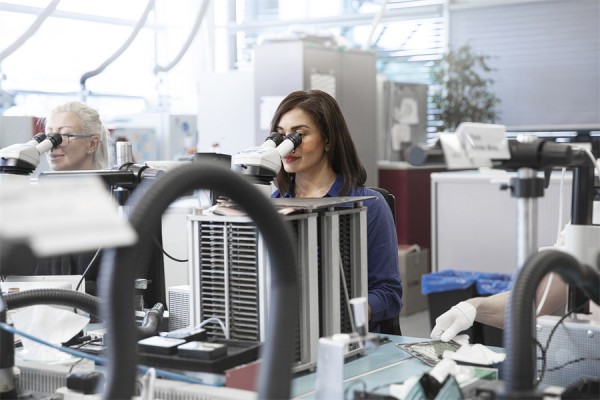
- Home
- Media Center
-
Events
- Wuzhen Summit
- Regional Forums
- Practice Cases of Jointly Building a Community with a Shared Future in Cyberspace
- World Internet Conference Awards for Pioneering Science and Technology
- The Light of Internet Expo
- Straight to Wuzhen Competition
- Global Youth Leadership Program
- WIC Distinguished Contribution Award
- Membership
- Research & Cooperation
- Digital Academy
-
Reports
- Collection of cases on Jointly Building a Community with a Shared Future in Cyberspace
- Collection of Shortlisted Achievements of World Internet Conference Awards for Pioneering Science and Technology
- Reports on Artificial Intelligence
- Reports on Cross—Border E—Commerce
- Reports on Data
- Outcomes of Think Tank Cooperation Program
- Series on Sovereignty in Cyberspace Theory and Practice
- Other Achievements
- About WIC
- 中文 | EN

Sonova to expand AI-powered hearing aids
Firm aims for more growth as penetration rate still low among Chinese users

Arnd Kaldowski, CEO of Switzerland-based multinational hearing solutions provider Sonova, says he believes that visiting China "at least three times a year" is important. [CHINA DAILY]
To Arnd Kaldowski, CEO of Switzerland-based multinational hearing solutions provider Sonova, visiting China "at least three times a year" is important, quoting one of his former bosses to explain, "if you are not in China, you are not global".
During his latest five-day stay in China in early September, Kaldowski met Shanghai Mayor Gong Zheng to obtain a better understanding of the city's focus on the development of high-end rehabilitation medical devices and the local government's dedication of introducing more health and well-being solutions for the elderly population.
Sonova, the world's largest hearing aid company according to market consultancy Statista, is well-positioned to help achieve such goals.
With its first footprint set in China over 20 years ago, Sonova set up a Suzhou plant in 2003, its China headquarters in Shanghai in 2022, and made the acquisition of Hysound Group at the end of 2022. To date, Sonova has about 200 clinics in over 20 provincial-level regions.
China is already one of the largest income contributors to Sonova, which achieved sales of about 3.63 billion Swiss francs ($4.23 billion) globally in the 2023/24 fiscal year. The company employs over 1,700 people in China, outnumbering that of its global headquarters in Switzerland.
To better cater to the needs of tech-savvy Chinese users, Sonova launched self-fitting devices in May via Sennheiser, the audio consumer brand that is better known in the Chinese market and the Sennheiser Consumer Division that Sonova acquired in 2021.
To improve the user experience on a broader scale, Sonova launched in August what it says is the world's first hearing aid to use real time artificial intelligence. The AI-powered device uses advanced technology to not only reduce and cancel unwanted noises, but also learn from the user and enhance the words that they should and want to hear. The hearing aid will be available in China from February 2025.
It took Sonova six years to improve the chip technology and train the deep neural network. By using Bluetooth connectivity, Sonova has also built an application for smartphones so that no latency exists between the speech and the user's hearing.
Of course, that requires huge investment. Sonova's R&D spending has spiked by 60 percent over the past five years. But there is also contribution from China. Its Chinese team has helped to optimize the algorithms, especially those for tonal language, and some of the core technologies and components, such as rechargeable batteries and micro-electro-mechanical system technology, also come from China.

Sonova staffers work at one of the company's production centers. [CHINA DAILY]
"China is an important part not only from a manufacturing and consumer perspective, but also from an innovation perspective," said Kaldowski.
There is still room for growth, as the penetration rate of hearing aid products is still quite low among Chinese users, according to Kaldowski.
For those Chinese who require full medical devices fitted by an audiologist, only 3 percent of them get one, in contrast to the 25 to 35 percent ratio in developed markets. As to amplifiers, which are less sophisticated and cheaper, the penetration rate is another 3 percent in China, he said.
China also has an aging population. Data released by the Ministry of Civil Affairs in early September showed that there were about 297 million people aged above 60 in China in 2023, accounting for 21.1 percent of the total population, up from 19.8 percent a year earlier.
About 30 percent of this group of people face hearing loss, said Wang Shufeng, deputy director of Beijing Society of Audiology.
According to Kaldowski, adults generally start to encounter hearing loss around the age of 60, and almost everybody needs hearing aids after crossing the 80-year-old mark. While income levels have been increasing in China, the penetration rate of such aids will pick up, he said.
However, the Chinese hearing aids market has experienced some volatility over the past few months. Lack of consumer confidence at a time of economic slowdown was probably the main reason, explained Kaldowski.
Globally, Sonova reported a 3.2 percent annual sales revenue increase in local currencies for the past fiscal year and is projected to see a growth rate of between 6 and 9 percent for fiscal year 2024/25.
Against that backdrop, Sonova has managed to register strong growth in China recently. For example, Hysound performed ahead of plan during its first full year with Sonova (fiscal year 2023/24) ending on March 30, 2024. Sonova sees this achievement as a great runway to deliver double-digit growth for the next three to five years.
Meanwhile, its four major business units — hearing instruments, audiological care, consumer hearing and cochlear implants — have sought balanced growth in China, according to Kaldowski.
"There's no question that China will become one of the most important markets of the world, perhaps even the most important in size, which we will see over the next 10 to 15 years," he said.
The acquisition of Hysound's audiological care clinics will help to achieve that target as Sonova has managed to build up an offline retail network of over 200 stores in China through the deal.
Despite digitalization reshaping many aspects of consumer behavior, about 70 percent of people using hearing aids still make their purchases in audiological care clinics. And, although technically possible, only 5 percent of fittings globally are done remotely.
"A vast majority of the consumers like to have a personal relationship with the hearing care professional. They need diagnosis and fittings very often," explained Kaldowski.
Meanwhile, such consumer visits provide regular feedback on the devices and highlight usage behavior. To Sonova, such important raw data can help to further optimize the devices, he said.

The World Internet Conference (WIC) was established as an international organization on July 12, 2022, headquartered in Beijing, China. It was jointly initiated by Global System for Mobile Communication Association (GSMA), National Computer Network Emergency Response Technical Team/Coordination Center of China (CNCERT), China Internet Network Information Center (CNNIC), Alibaba Group, Tencent, and Zhijiang Lab.





